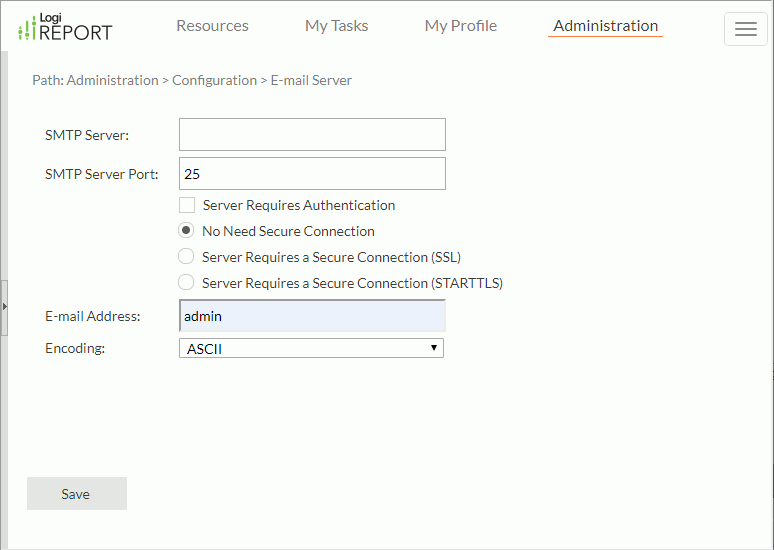Configuring the Email Server
In order for users to publish report results to email and to notify the task status via email when scheduling tasks to run reports, create in-memory cubes, or create CRDs, administrators need to configure an email server in advance. This topic describes how you can configure an email server on the Server Console.
- On the system toolbar of the Server Console, navigate to Administration > Configuration > E-mail Server. Server displays the E-mail Server page.

- In the SMTP Server text box, type the numeric or named host of the machine where the email server is located.
- In the SMTP Server Port text box, type the port where the email server runs.
- If the SMTP server requires authentication, select Server Requires Authentication, then specify the username and password for signing in to the SMTP server.
- If the SMTP server does not need a secure connection, keep the option No Need Secure Connection selected. If it requires a secure connection, select Server Requires a Secure Connection (SSL) or Server Requires a Secure Connection (STARTTLS) according to the SMTP server configuration.
- In the E-mail Address text box, type the address of the email sender. Make sure that the format of the specified address is valid.
- From the Encoding list, select the encoding for the titles and comments of the email.
- Select Save to apply the settings.
Logi Report Server saves the email server settings in the file mailconfig.properties in the <install_root>\bin directory. You can also use the file for default email server configuration. The following table lists the available properties and the UI options they are mapped to.
| Property in mailconfig.properties | Mapped UI Option |
|---|---|
| smtp.server | SMTP Server |
| smtp.server.port | SMTP Server Port |
| smtp.authentication | Server Requires Authentication |
| smtp.SSL | Server Requires a Secure Connection (SSL) |
| smtp.TLS | Server Requires a Secure Connection (STARTTLS) |
| mailbox | E-mail Address |
| mail.encoding | Encoding |
| smtp.user | SMTP Login Account > User Name |
| smtp.password | SMTP Login Account > Password |
 Previous Topic
Previous Topic
 Back to top
Back to top